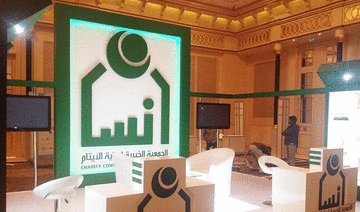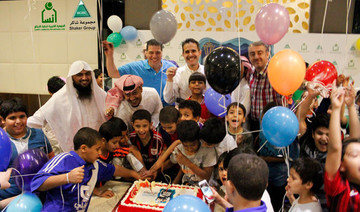A proposal to make it illegal to drive vehicles in the Gulf States while wearing the veil could hamper efforts by Saudi women to drive cars in the Kingdom.
The Directors General of the Gulf Cooperation Council, in its 13th meeting on Monday in Jeddah, considered the draft from Gulf traffic departments as part of a larger effort to outline more specific unified traffic violations for all Gulf States.
While the draft is not a blanket ban on the veil, its passage into law would make it illegal for drivers to cover their faces in front of traffic police officers.
The Oman municipal traffic departments initially brought the issue to the GCC’s interior ministries. The proposal, described as the Gulf Traffic Act, specifies the “burqa,” “Algshawh” or "face veil" as illegal attire to wear while driving. GCC Council members tabled the discussion until its next meeting.
If adopted as a uniform law by the GCC traffic departments, the issue may have a significant impact on Saudi women’s attempts to drive cars anywhere in the GCC. But it would in particular affect potential female drivers in Saudi Arabia since a large portion of the female population wear the veil. Saudi women already drive cars in other GCC countries.
While speaking with Arab News, several Saudi women said it's their right to drive a vehicle with or without the veil.
Buhi Mohammed Khalid cultural adviser at Royal Saudi Embassy in UAE said that more than 50 percent women in UAE drive their own cars.
“I myself drive while covering my face; most of the women drivers, I find here, cover their faces, especially the old aged women drivers,” Khalid said.
“Though the youngsters don’t like to cover their faces, most Arab women cover their faces and drive, so it is not possible that they can put any ban on veil while driving.”
Ala’a Mohammed, another driver, said that women have the right to cover themselves.
“In Saudi Arabia we are not allowed to drive at all,” Mohammed said. “For this reason when Saudi women go to any Gulf country or abroad they drive the car. It totally depends on them whether they drive with the veil or without. Putting a ban on it will not be right.”
Khaloud Asmari, a Saudi student, said that traffic departments should look for a solution to this problem, but not put a ban on the veil.
“It will hurt our culture and traditions,” Asmari said. “Many women were riding horses in Prophet’s era, riding on camels, but we are not allowed to drive our own car.”
Abu Ahmed, a Saudi motorist, said it’s wrong for traffic departments to issue traffic violations to veiled women.
“There are a number of benefits of women driving their own cars as they can do their work by themselves instead of paying half of their salary to drivers every month,” Ahmed said.
Among other proposed traffic violations, the GCC would make it illegal to use a speed detection device that warns drivers of law enforcement speed radars. Vehicles that have a large accumulation of dirt that distorts the vehicle’s appearance and reading while drive also would be illegal.
Brig. Saleh Ahmed, head of the delegation for Kuwait, recommended during the meeting that delegates unite the “irregularities” in the GCC countries by monitoring them through an electronic link. He suggested connecting the driver’s licenses, vehicle ownership and technical maintenance and irregularities to eliminate forgeries among all GCC drivers.
Saudi Arabia and the United Arab Emirates have agreed to pilot an electronic link between the two countries to monitor traffic violations as the first stage of the process, which will lead to linking all GCC countries if the program is successful.
Traffic accidents in the GCC cost about $ 19 billion annually in losses, representing 3.7 percent of the total global losses.
Gulf women drivers reject the idea of removing veil
Gulf women drivers reject the idea of removing veil

Saudi defense minister, Yemen PM discuss relations

RIYADH: Prince Khalid bin Salman, Saudi minister of defense, met with Yemen’s newly-appointed Prime Minster Salem Saleh Bin Braik.
The pair discussed ways to boost Saudi-Yemeni relations, in addition to regional developments and the situation in Yemen.
”I reaffirmed the Kingdom’s continued support for the government of Yemen in ways that will meet the aspirations of the Yemeni people,” Prince Khalid said in a post on X.
He also conveyed the Saudi leadership’s best wishes to Bin Braik after his appointment as Prime Minister, as well as their hopes for his success and for the stability, security, and prosperity of the people of Yemen.
Yemen’s internationally recognized government named finance minister Bin Braik as its new prime minister on Saturday.
UNESCO delegation visits North Riyadh Geopark after global network listing

- Destination showcases Kingdom’s natural and cultural diversity, UNESCO official says
- In April, UNESCO listed North Riyadh Geopark and Salma as part of its Global Geoparks Network
RIYADH: UNESCO’s Assistant Director-General for Natural Sciences, Lidia Brito, visited North Riyadh Geopark on Sunday, praising the destination for preserving both nature and history.
The UN Educational, Scientific, and Cultural Organization designated North Riyadh Geopark in April as part of its Global Geoparks Network, which aims to protect geological heritage sites and promote sustainable development.
Hussam Zuhair Al-Turki, director of the Saudi Geoparks Initiative, and Hamoud Alnughaymishi, director of the Science Sector at the Saudi National Commission for Education, Culture, and Science, accompanied Brito during her visit.
They explored significant geological features at the North Riyadh Geopark, including the Abu Shaddad Cave and the Edge of the World cliff. They also stopped to explore Ghamra Village, known for its natural adventure routes on the outskirts of Riyadh.
Brito said that the North Riyadh Geopark showcases the natural and cultural diversity of Saudi Arabia, and will enhance eco-tourism in the Kingdom, the Saudi Press Agency reported.
In April, UNESCO designated North Riyadh Geopark and Salma Geopark as part of its Global Geoparks Network. The Kingdom hopes to register 13 other sites on UNESCO’s network, the SPA added.
Riyadh’s latest group game spot encourages social connection

- Center designed to engage people physically, mentally
RIYADH: As Saudi Arabia encourages more active and social lifestyles, a group of young Saudi entrepreneurs in Riyadh has created a space that blends movement, mental challenges, and social connection.
Opened in 2024, Pixel Games is a locally developed gaming center designed to engage people both physically and mentally. It is also a testament to the vision and drive of young Saudis, who are shaping the Kingdom’s entertainment landscape.

Riyadh has no shortage of entertainment options, and Pixel Games adds to the city’s growing roster of homegrown concepts.
While the founders would like to keep a low profile, they are working behind the scenes to address the local appetite for interactive social spaces that go beyond traditional arcades or seasonal pop-ups.
FASTFACTS
• Activities at Pixel Games range from strategic puzzles to movement-based games, all designed for groups of friends and families to enjoy together.
• Each session lasts an hour, and visitors can reserve private rooms for a more personal experience.
The center features nine themed “moving rooms,” with more than 40 group-based physical and mental challenges.

Activities range from strategic puzzles to movement-based games, all designed for groups of friends and families to enjoy together. Each session lasts an hour, and visitors can reserve private rooms for a more personal experience.
Visitors have responded positively to the experience. Nawaf Aloggayel, a recent guest, said: “The place is beautiful, the games are different and fun, and the prices are reasonable.

“I advise people to come … it’s the best entertainment place in Riyadh so far.”
Ahmed Al-Ahmed, marketing representative for Pixel Games, said: “Pixels is an entertainment center that gathers challenges and fun into a group of different movement activities.
“Groups can enjoy a private room, which makes it more exciting and comfortable.”
What sets it apart is its year-round availability, making it a go-to spot for spontaneous plans or scheduled outings. It provides a safe and stimulating environment where children can burn off energy, develop problem-solving skills, and socialize with their peers.
Whether you are looking for a quick group activity, a family outing, or a way to try something new with friends, Pixels offers a low-key alternative for playful competition and connection.
Biotech program to empower Saudi innovators

- The seven-month program offers participants mentorship, capacity development, and networking opportunities with local and international investors and experts
RIYADH: The Ministry of Health has launched a biotechnology accelerator program to empower Saudi innovators in biotechnology and life sciences.
The initiative aims to enhance their scientific and commercial readiness, attract investment, and expand their global market reach, the Saudi Press Agency reported.
It also seeks to boost their contributions to healthcare quality, aligning with the National Biotechnology Strategy and the Health Sector Transformation Program under Vision 2030, which envisions a thriving, innovation-driven economy and a vibrant society with sustainable health and quality of life.
The seven-month program offers participants mentorship, capacity development, and networking opportunities with local and international investors and experts.
It includes workshops, seminars, individual consultations, and a chance to present innovations at the BIO 2025 Conference.
The application deadline is May 8. Interviews and initial selection will take place from May 15-20, with final acceptances announced on May 25.
The ministry continues to advance health innovation and accelerate the progress of promising national projects. It encourages all Saudi innovators, entrepreneurs, and startups to register for the program and inquire via redbiotech@moh.gov.sa
Insan spends SR55m on beneficiary families in first quarter of 2025

- Programs aim to meet needs through seasonal initiatives, monthly services, direct assistance
RIYADH: The Charitable Society for Orphans Care in Riyadh, also known as Insan, implemented several programs during the first quarter of 2025 aimed at meeting the needs of families through seasonal initiatives, monthly services, and direct assistance.
Total expenditure on services and initiatives provided during the first quarter amounted to SR55.09 million ($14.66 million), which included basic, seasonal, and other services.
The society deposited SR27.6 million into families’ bank accounts for basic expenses (cash, clothing, and food).
It also deposited SR2,790,600 for the Ramadan Basket Project, benefiting 9,251 families to meet their needs during the holy month of Ramadan, and SR1,060,800 for the Eid Gift Project, helping 5,304 through special gifts during Eid Al-Fitr.
There were more than 21,000 beneficiaries from the Zakat Al-Fitr project during the first quarter, covering their food needs before Eid Al-Fitr, at a cost of SR3.86 million.
The quarterly report issued by Insan highlighted the numerous programs and activities provided by it, including Imaniyat, Pioneers of the Future, Be a Human Compass, Mualham, and Medad.
These programs included developmental and empowerment paths, helping 2,853 beneficiaries.
In line with its commitment to meeting the needs of beneficiary families, Insan provided 7,725 diverse services during the first quarter, including emergency assistance, social and health support, bill payments, housing expenses, furnishing and maintenance, contributions to home purchases, healthcare, and other services. The society spent SR19,773,339 on these services.
It also conducted 1,469 visits to families in the first quarter. These assessed conditions, listened to needs, and identified requirements. The family satisfaction rate reached 93 percent.
In an effort to empower beneficiaries in various fields, the society conducted 436 applications for training, diploma, bachelor’s degree, employment, and project financing.


















